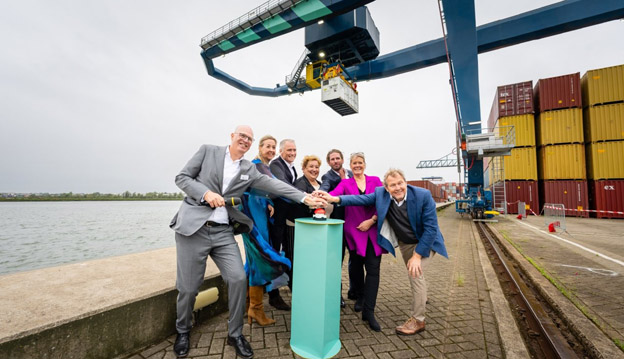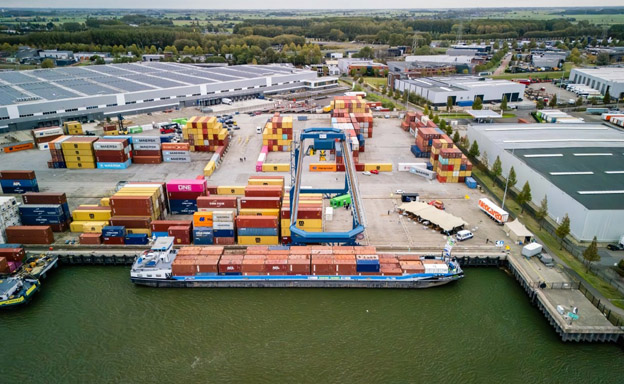
Inland Terminals Group (ITG), Zero Emission Services (ZES) and Nedcargo are launching fully emission-free container transport on inland waterways. From today, the inland vessel MS Den Bosch Max Groen will sail with exchangeable battery containers on board. With this electric propulsion system, no CO2, nitrogen or particulate matter is emitted. This marks a significant sustainable boost for inland shipping.
ZES offers an innovative solution for making inland shipping more sustainable through mobile, swappable battery containers (Zespacks). These large-scale batteries provide inland vessels with clean energy without long charging times.
Michael Beemer, CEO of ZES:
“It is our mission to make inland shipping emission-free. We are achieving this with support from the National Growth Fund and the Province of South Holland. With our pay-per-use model, shipowners pay only for the energy they actually consume. This makes the switch to battery-electric sailing financially more attractive. In addition, a subsidy scheme is available for shipowners.”
Arne Weverling, Provincial Executive of South Holland, adds:
“We support this initiative with one clear goal: a healthier and more liveable province. At the same time, we ensure that inland shipping remains future-proof and competitive, so that waterborne transport continues to be a sustainable and attractive alternative in a province where road congestion is ever increasing.”

Scaling up with ZES 2.0
The launch of this service between Den Bosch and the port of Rotterdam marks an important milestone for ZES. Michael Beemer: “Together with partners such as Heineken and CCT, we have optimised the operation of battery-powered vessels. With the introduction of ZES 2.0 we are ready for the next phase. Vessels can now swap containers at three locations: Alphen aan den Rijn, Alblasserdam and Den Bosch. More terminals will soon follow in Rotterdam, Moerdijk and Nijmegen. This establishes a robust network that makes battery-electric inland shipping more accessible.”
800 tonnes of CO2 reduction per year
Eduard Backer, CEO of ITG:
“By working together with ZES, Heineken and Nedcargo, we are achieving our sustainability ambitions. I am proud that the partners are showing such courage. This project is part of our broader strategy to keep the Netherlands both clean and accessible. It cuts CO2 emissions by 800 tonnes a year. That momentum must be carried forward. With battery swapping stations at our terminals we are making a concrete contribution to lowering emissions. Alblasserdam is an ideal location for battery swaps close to the port. Our terminals also have the capacity to grow in volume, helping to ease congestion on the roads.”
According to Eduard Backer, shippers can rapidly reduce their Scope 3 emissions by choosing waterborne transport: “Alongside this battery-electric vessel, our group also operates a hydrogen-powered ship. Hydrogen is suited to longer distances, while battery containers are ideal for shorter shuttle services. Waterborne transport is the path to a lower footprint. And with the upcoming CO2 levy (ETS-2), this will also bring financial benefits for shippers.”
Piet-Hein Timp, Procurement Manager for Sustainability and Energy at Heineken, supports this battery-electric development:
“At Heineken we are committed to decarbonising our supply chain. The collaboration between ITG, ZES and Nedcargo is a fine example. We started transporting containers by inland shipping in 2010. It is a positive development that ITG, in addition to CCT, is now also enabling battery-electric inland container transport. We hope to inspire other shippers to also make use of this sustainable option.”
 KEYFACT Energy
KEYFACT Energy